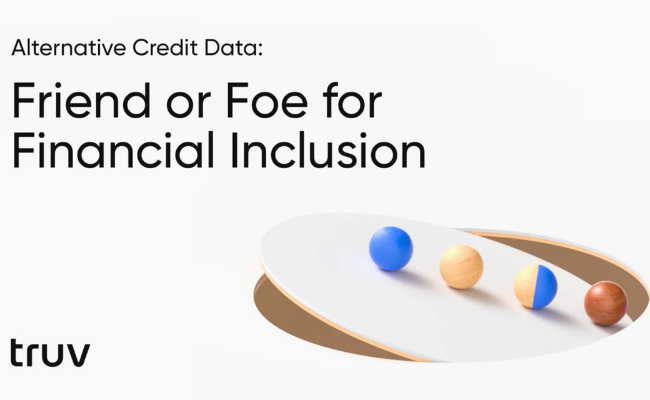In recent years, payday lending and other alternative forms of lending have been under intense scrutiny due to their high costs and rigid repayment structures. While critics raise concerns about these practices, proponents argue that they serve as a crucial lifeline for subprime consumers in times of financial hardship. However, amidst these ongoing debates, a game-changing development has emerged, holding the potential to reshape the narrative and drive progress in achieving financial inclusion: the utilization of alternative credit data.
A Turning Point: Embracing Alternative Data
On February 16, 2017, Richard Cordray, the former director of the Consumer Financial Protection Bureau (CFPB), made a powerful statement recognizing the potential of alternative data:
“Alternative data from unconventional sources may help consumers who are excluded from traditional credit systems establish a credit history and access mainstream credit sources. We want to explore whether this non-traditional approach can provide opportunities for millions of credit invisible Americans, while minimizing associated risks.”
The idea was both simple and influential: By considering alternative payment history from sources such as payday loans and title loans, we could shed light on the credit behavior of underserved consumers and facilitate their access to credit.
Blurring Boundaries: Bridging Mainstream and Alternative Credit
Following the CFPB’s endorsement of alternative data, the three largest mainstream credit bureaus embraced this approach by acquiring alternative credit bureaus that track non-traditional lending behavior:
TransUnion acquired FactorTrust on November 14, 2017.
Experian acquired Clarity Services on March 19, 2018.
Equifax acquired DataX on July 16, 2018.
These acquisitions marked a pivotal shift. Previously, mainstream credit bureaus did not consider alternative loan history, and payday lenders often promoted their loans as having no impact on credit scores. However, with the integration of alternative data, the once-impenetrable wall separating these two worlds has crumbled.
Unveiling Hidden Signals: The Dual Impact of Alternative Data
While incorporating alternative loan repayment histories may initially seem to reduce a consumer’s risk profile, the reality is more nuanced. This data not only indicates a consumer’s willingness to repay but also highlights potential financial distress.
How does this play out in the real world? An analysis conducted by one of the traditional credit bureaus revealed that subprime consumers who utilize payday and alternative loans experience a more than 50% higher loss rate on their bank loans compared to their counterparts who don’t. Traditional bank lenders find it challenging to absorb this increased risk, resulting in the exclusion of a significant portion of underserved consumers, with only around 10% being served.
Truv Provides a Comprehensive Perspective
One particular type of alternative credit data that often harms underserved consumers is alternative payment history. Truv leverages Financial Behavior Attributes to analyze raw banking data, assessing both traditional and alternative lending payment behavior, as well as overall financial health. This approach enables us to gain a more accurate understanding of the impact of alternative loan usage.
We selected a sample of subprime consumers from our credit database and divided them based on their usage of payday or alternative loans. We then examined their repeat Non-Sufficient Funds (NSF) rates in the subsequent two-month period to evaluate differences in risk levels. NSFs serve as a generalized form of payment default and offer a reliable proxy for overall risk. Initially, our data confirms that subprime consumers who use payday loans present higher risk.
However, our analysis did not stop there. Leveraging our Financial Behavior Attributes, we constructed a risk model specifically tailored to the payday loan population, taking into account a comprehensive profile of their financial behavior. This model paints a markedly different picture of the underserved consumer population.
Our model identifies six times more low-risk consumers than alternative models because 60% of payday loan consumers exhibit repeat NSF rates lower than subprime consumers who do not use payday loans. By utilizing our Financial Behavior Attributes, we have developed a risk model that provides a more comprehensive profile of consumer financial behavior.
Advancing Financial Inclusion
While alternative data can be a powerful tool for promoting financial inclusion, it must be used responsibly to avoid unintended consequences. To achieve a balanced and accurate consumer view, it is essential to combine alternative loan payment history with data that measures financial health and recovery.
At Truv, we offer a range of attributes and models that provide a complete consumer view. By equipping lenders with these tools, we enable them to responsibly and profitably expand their lending businesses in underserved markets. With a balanced approach, significant strides can be made towards achieving the goal of financial inclusion.
Advancing Financial Inclusion: Empowering Underserved Consumers through Alternative Credit Data
The integration of alternative credit data represents a turning point in the financial industry’s approach to serving underserved consumers. By embracing alternative data sources and analyzing a more comprehensive range of financial behaviors, lenders can gain a deeper understanding of consumers’ creditworthiness. This understanding, combined with responsible lending practices, can empower underserved individuals to access mainstream credit and improve their financial well-being. Truv is committed to advancing financial inclusion by providing lenders with the tools they need to make informed decisions and expand access to credit for all.











































